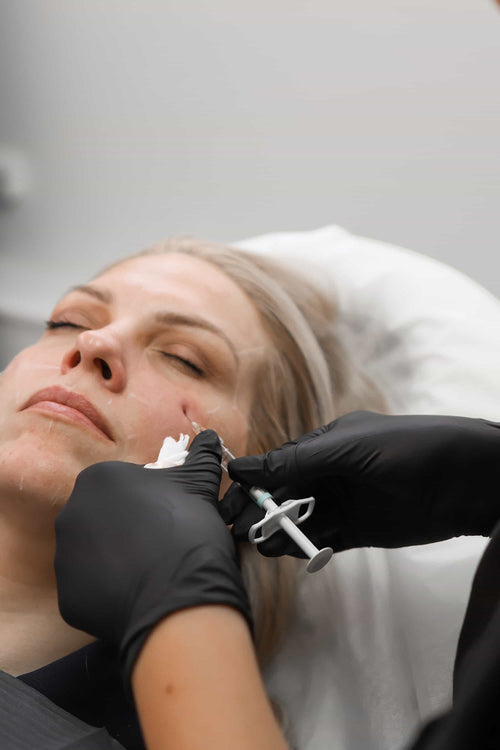What Vitamin Deficiency Causes Sagging Skin?
Book Your Dermal Filler Appointment with Dr. Laura Geige Now
Vitamin C
Collagen Production
Sagging skin, a common concern as we age, can be influenced by various factors, including **vitamin deficiencies**. One key nutrient that plays a crucial role in maintaining skin elasticity and firmness is **Vitamin C**.
Vitamin C is a potent antioxidant that helps protect the skin from damage caused by free radicals. Free radicals are unstable molecules produced by environmental stressors such as UV radiation, pollution, and smoking. They can damage collagen fibers, leading to wrinkles, sagging, and other signs of aging.
**Collagen**, a protein that provides structure and support to the skin, is essential for maintaining its youthful appearance. Vitamin C is vital for **collagen synthesis**. It acts as a cofactor for enzymes involved in the production of collagen, ensuring that new collagen fibers are formed efficiently.
When there is a deficiency of Vitamin C, collagen production slows down or may even stop altogether. This weakens the skin’s structure, making it more susceptible to sagging and wrinkling.
Therefore, maintaining adequate levels of **vitamin C** through diet or supplementation can help support healthy collagen production, protect against free radical damage, and contribute to firmer, more youthful-looking skin.
Skin Health Benefits
Vitamin C is a potent antioxidant crucial for skin health and plays a vital role in collagen synthesis. Collagen is a structural protein that provides firmness and elasticity to the skin, keeping it looking youthful and plump.
A deficiency in vitamin C can lead to impaired collagen production, resulting in weakened skin structure and increased risk of sagging.
Here’s how Vitamin C benefits your skin:
-
Collagen Synthesis:** Vitamin C is a cofactor for enzymes involved in the synthesis of collagen, the protein that provides strength and structure to the skin.
-
Antioxidant Protection:
Vitamin C neutralizes free radicals, unstable molecules that can damage skin cells and contribute to premature aging.
-
Enhanced Skin Barrier Function:
Vitamin C helps maintain the integrity of the skin’s barrier, protecting it from environmental stressors and moisture loss.
-
Brightening Effects:
It can help inhibit melanin production, reducing hyperpigmentation and promoting a more even skin tone.
Schedule a Dermal Filler Consultation with Dr. Laura Geige Now
Signs of vitamin C deficiency may include dry, rough, and pale skin, as well as increased bruising and slow wound healing.
Vitamin A
Retinoids and Skin Cell Renewal
Vitamin A plays a crucial role in maintaining healthy skin due to its influence on *skin cell renewal* and collagen production.
A deficiency in vitamin A can lead to several skin problems, including dryness, roughness, and an increased risk of **sagging skin**.
This occurs because Vitamin A is essential for the differentiation and maturation of skin cells. When levels are low, cell turnover slows down, resulting in dullness and a weakened skin barrier.

Furthermore, vitamin A supports the production of collagen, a protein that provides structure and elasticity to the skin.
Insufficient Vitamin A can therefore contribute to the breakdown of collagen, making the skin more prone to sagging and wrinkling over time.
*Retinoids*, which are derivatives of vitamin A, have become popular ingredients in skincare products for their ability to promote cell turnover and stimulate collagen synthesis.
They work by binding to specific receptors within skin cells, triggering a cascade of events that leads to increased collagen production, reduced wrinkles, and improved skin texture.
Topical retinoids are available in various strengths and formulations, ranging from over-the-counter creams to prescription medications.
It’s important to note that retinoids can cause some side effects, such as dryness, irritation, and sun sensitivity.
Therefore, it’s essential to start with a low concentration and gradually increase the frequency of use.
Always consult with a dermatologist before starting any new skincare regimen, especially if you have sensitive skin or pre-existing skin conditions.
Antioxidant Protection
Vitamin A plays a crucial role in maintaining healthy skin by promoting cell growth and differentiation. It also contributes to collagen production, which provides structural support and elasticity to the skin.
Vitamin A deficiency can lead to several skin problems, including dryness, roughness, and wrinkles. This occurs because vitamin A is essential for the proper function of sebaceous glands, which produce oil that keeps the skin moisturized.
Without sufficient vitamin A, these glands may become less active, resulting in dry, flaky skin. Additionally, vitamin A deficiency can impair collagen synthesis, leading to decreased skin elasticity and the appearance of sagging skin.
Antioxidants are compounds that protect cells from damage caused by free radicals. Free radicals are unstable molecules that can damage DNA, proteins, and lipids, contributing to aging and various diseases. Vitamin A, in particular retinol, acts as an antioxidant and helps neutralize these harmful free radicals, protecting the skin from oxidative stress.
Oxidative stress is a major contributor to skin aging, causing wrinkles, fine lines, and age spots. By scavenging free radicals, vitamin A helps reduce this damage and preserve the skin’s youthful appearance.
Therefore, maintaining adequate levels of vitamin A through diet or supplementation can support healthy skin function, collagen production, and antioxidant protection, which are all essential for preventing sagging skin and promoting a more youthful complexion.
Other Potential Culprits**
Zinc Deficiency Biotin Deficiency
While Vitamin C deficiency (scurvy) is widely known for its impact on collagen production and skin health, other nutritional deficiencies can also contribute to sagging skin.
**Zinc** plays a crucial role in collagen synthesis and wound healing.
A zinc deficiency can impair these processes, leading to thinner, weaker skin that is more prone to sagging.
Similarly, **biotin** is essential for healthy skin cell growth and repair.
Insufficient biotin intake may result in dryness, thinning, and a loss of elasticity, contributing to the appearance of sagging skin.
Consult Dr. Laura Geige for Your Dermal Fillers Now
Electric Youth Magazine Andrea McGinty Art Azmia Magane Audrey’s JL Electric Youth Magazine
- Botox For Downturned Smile In Knightsbridge, London - May 24, 2025
- Traptox Aka Trapezius Botox Treatment Near Puttenham, Surrey - May 23, 2025
- Neauvia Hydro Deluxe Skin Booster Treatments Near Ripley, Surrey - May 23, 2025
